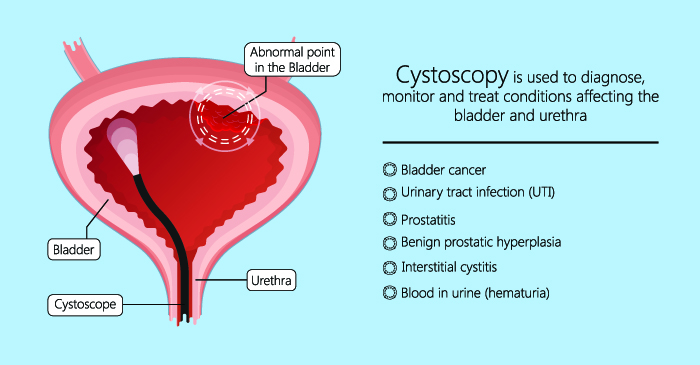Cystoscopy Surgery in C-scheme, Jaipur
Cystoscopy is a treatment procedure conducted by your doctor to check for any abnormalities in the lining of the bladder and to check the tube that flushes out the urine from the body. A cystoscopy is performed with the help of a special instrument known as a cystoscope. It is a hollow tube that comes with a lens to produce images of the insides of your bladder and urethra.

Why is Cystoscopy Done?
Cystoscopy is done to diagnose, monitor, and treat some of the conditions that negatively affect the bladder and urethra. It can be to;
- It is done to investigate the reason behind the signs and the symptoms that you have been experiencing
- It can help identify any bladder disease and conditions
- It can also help treat bladder disease and conditions like very small bladder tumors
- It can diagnose enlarge prostate
Cystoscopy can be followed up by a second procedure known as ureteroscopy, which uses a smaller scope to diagnose the tubes that connect your kidneys to the bladder that carries urine.
Are There Any Risks Associated With Cystoscopy?
Although if you visit the right doctor, like the specialists at Apollo Spectra, Jaipur, the risks of cystoscopy go down. But, some of the complications associated with the treatment include;
- Infections - Very rarely, cystoscopy can causes infections in the urinary tract by introducing germs.
- Bleeding - It can sometimes cause blood in the urine, but again, serious bleeding rarely occurs.
- Pain - There are chances you may experience abdominal pain and a burning sensation.
When to See to a Doctor at Apollo Spectra, Jaipur?
You must visit a doctor immediately if;
- You are unable to pee after the procedure
- If you notice blood or blood clots in your pee
- If you have been experiencing abdominal pains and chills
- Fever that’s higher 101.4 F
- Pain or burning while urinating
Request an appointment at Apollo Spectra Hospitals, Jaipur
Call 1860 500 2244 to book an appointment.
How to Prepare for the Procedure?
- Your doctor might prescribe antibiotics that you may have to take before and after the cystoscopy if you are prone to infections.
- You may have to wait to empty your bladder as your doctor might have to conduct a urine test before your cystoscopy
What Happens During Cystoscopy?
This procedure usually takes about 15 minutes as an outpatient procedure and 30 minutes when conducted in the hospital under general anaesthesia.
- First, you will be asked to empty your bladder by your doctor and you will have to lie down on the hospital table and put your feet up on the stirrups
- Anaesthesia will be administered that will help you relax and avoid any pain
- Once the anaesthesia takes effect, the cystoscope will be inserted into the urethra after rubbing a numbing gel
- Once the instrument is inside, your doctor will look around to check for any abnormalities
- A solution is then introduced to inflate your bladder to ensure your doctor will be able to look into the bladder clearly.
- This can make you feel an urge to urinate.
- The tissue samples might be taken for further testing
What Happens After the Cystoscopy?
If you have been given general anaesthesia, you will have to wait in the hospital till the effects wear off. You will be allowed to resume your normal duties soon, but may experience a few side effects. They are;
- Bleeding from the urethra (You may notice pinkish urine)
- You may have a burning sensation during urination
- Frequent urination
What Are Some of The Things You Can Do To Avoid Discomfort?
- Drink lots of water
- Take pain-killers if necessary
- Take a warm bath
Cystoscopy is a safe procedure and is suggested only when necessary. So, don’t be nervous or panic and talk to your doctor if you have any questions.
A urologist performs cystoscopy.
No, it’s generally a very safe procedure.
While it is normal to notice some blood in your urine, it is not dangerous. Damage happens only in rare cases.
Symptoms
Our Top Specialities
NOTICE BOARD
CONTACT US
CONTACT US
 Book Appointment
Book Appointment


.svg)
.svg)
.svg)
.svg)








